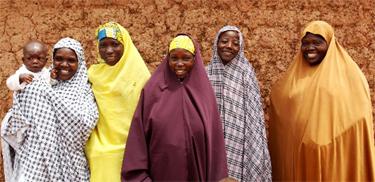
Can all of Nigeria be Open Defecation Free by 2025? A Water, Sanitation and Hygiene Committee in the remote northern village of Gidan Darge is paving the way.
JIGAWA STATE, Nigeria, 25 May 2016 – In north-eastern Nigeria, 300 miles north of the capital city of Abuja, lies the village of Gidan Darge. Though the village is located in a dry, remote area, it is pioneering advances in water, sanitation and hygiene for the entire country.
Back in 2008, Gidan Darge was one of the first communities in all of Nigeria to be declared Open Defecation Free (ODF) as part of the Community-led Total Sanitation (CLTS) Programme. The initiative aims to ensure all families construct their own latrines, have access to safe water, and practice good handwashing techniques.
To help inspire behaviour change, water and sanitation officers from the local government visited the village and worked with community volunteers to give a set of simple yet powerful demonstrations. For example, the ‘open defecation mapping’ demonstration had the community come together to draw a map of the village, highlighting water sources, houses and places where people practice open defecation. The facilitator then drew the link between open defecation and disease by showing how, when it rains, faeces will wash into nearby water sources and make their way back into the households.
Habiba Umar, 35, was one of 15 people who volunteered to help lead this behaviour change within her community. Together, the volunteers decided to form a Water, Sanitation and Hygiene Committee (WASHCom).
“Before, there used to be so much faeces in the community. It was everywhere, it was really terrible,” said Habiba. “I volunteered because I wanted to change this for my family, and also to help inspire other communities in the area. We were all experiencing the same problems and it was affecting our children’s health.”
Building trust, changing behaviour
Just 27 days after the community watched the demonstrations, all households completed the construction of their latrines and handwashing facilities. Three public latrines were also built during this time. The community was quickly declared ODF.
In collaboration with UNICEF, the Nigerian Government then installed a new handpump for the community, which now provides safe drinking water for everyone. It also ensures households can practice handwashing and keep their toilets clean.
But behaviour change does not happen overnight. It takes many months, if not years to become permanent. Being a WASHCom member is therefore a continuous commitment. Habiba and her colleagues constantly monitor progress, going house to house encouraging families to continue using and maintaining their facilities.
Their hard work continues to pay off. The village is visibly clean and all toilets are spotless. Even child and animal faeces have been banished from Gidan Darge village – and it hasn’t gone unnoticed.
“Now when the fish salesmen come round to the community, even they are shocked,” said Habiba with a laugh. “They are used to seeing so many flies wherever they go, but not in Gidan Darge.”
The impact of the CLTS programme was so significant that neighbouring communities soon became curious. “They came to us and asked us to help them follow in our footsteps – and we were more than happy to do so,” she said.
Inspiring action far and wide
Habiba and the other 14 WASHCom members have since gone on to spark all 26 neighbouring communities into action. It’s no easy task, as communities are sparsely distributed across a rough desert terrain.
“It was quite difficult at first, it takes time to build trust and get everyone to change their behaviour,” Habiba said. “There’s always a few stubborn people who don’t want toilets initially – and were resistant to change. But through persistence we got there eventually.”
Other functions of the WASHComs include managing the water pump, going house to house to check latrines, spreading hygiene messages and collecting funds. Households contribute around 100 naira (US$0.50) each month, or however much they can afford.
“We use to the money to repair the water pump if needed, upgrade latrine structures and buy basic medical supplies for the community,” said Idris Malami, the WASHCom Secretary. “The health centre is located quite far away, so it’s really helping to make a difference.”
Gidan Darge is one of 746 communities in Jigawa State that have been certified ODF so far. There is still a long way to go until the whole state is Open Defecation Free by 2025 – as planned by the Government. But with dedicated WASHCom members like Habiba and Idris leading the way, it seems that anything is possible.
Source: UNICEF
 FR
FR EN
EN AR
AR








